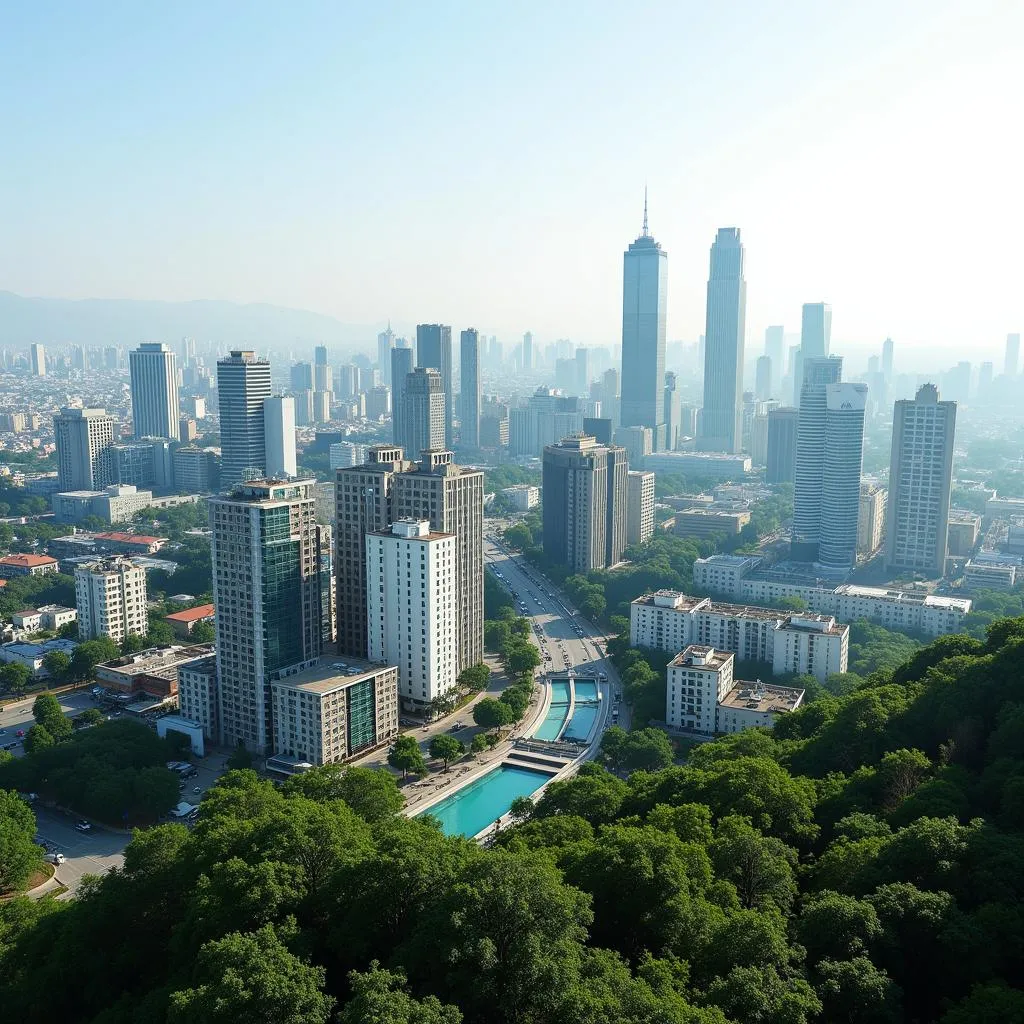African Countries with Highest GDP: Exploring the Continent’s Economic Powerhouses
Africa, a continent brimming with cultural richness and natural resources, is witnessing a period of remarkable economic transformation. While challenges remain, several African countries are experiencing significant GDP growth, attracting global attention and investment. This article delves into the top-performing African economies, exploring the factors driving their success and highlighting their potential for future prosperity.
Unveiling the Economic Giants: Top African Countries by GDP
Determining the African countries with the highest GDP requires careful consideration of various factors, including nominal GDP and purchasing power parity (PPP). Nominal GDP represents the total value of goods and services produced in a country at current market prices, while PPP adjusts for price differences across countries, providing a more accurate comparison of living standards.
Using nominal GDP, the largest economies in Africa as of 2023 are:
- Nigeria: Boasting the largest economy on the continent, Nigeria’s GDP is largely driven by its vast oil reserves, making it a key player in the global energy market.
- South Africa: Renowned for its well-developed financial, mining, and manufacturing sectors, South Africa maintains its position as a continental economic powerhouse.
- Egypt: Strategically located at the crossroads of Africa, Asia, and Europe, Egypt benefits from its Suez Canal revenues, tourism, and a burgeoning manufacturing industry.
- Algeria: With abundant natural gas and oil reserves, Algeria holds significant influence in North Africa and beyond. The country is also investing in renewable energy and infrastructure development.
- Morocco: Known for its agricultural exports, particularly in citrus fruits and vegetables, Morocco has also witnessed substantial growth in tourism, textiles, and automotive manufacturing.
Factors Driving Economic Growth: A Closer Look
The impressive GDP growth in these African nations can be attributed to several key factors:
- Abundant Natural Resources: Many African countries possess vast reserves of oil, natural gas, minerals, and arable land, providing a strong foundation for economic growth.
- Increasing Foreign Direct Investment: Recognizing the economic potential of the continent, international investors are increasingly channeling funds into infrastructure, technology, and other sectors, stimulating economic activity.
- Growing Consumer Market: With a young and expanding population, Africa represents a burgeoning consumer market, attracting businesses and driving demand for goods and services.
- Technological Advancements: The rapid adoption of technology, particularly in mobile banking and e-commerce, is transforming various sectors and facilitating economic growth.
- Government Reforms and Initiatives: Many African governments are implementing reforms aimed at improving business environments, attracting investment, and fostering economic diversification.
 African entrepreneurs using technology for business growth
African entrepreneurs using technology for business growth
Challenges and Opportunities: Navigating the Path Ahead
While the economic prospects for these African nations are promising, challenges remain. These include:
- Infrastructure Deficits: Inadequate infrastructure, particularly in transportation and energy, can hinder economic growth and limit investment opportunities.
- Political Instability: Political unrest and conflicts in some regions can create uncertainty and deter investment.
- Income Inequality: While GDP growth is evident, ensuring equitable distribution of wealth and addressing poverty remain crucial challenges.
Despite these challenges, the future of these African economies remains bright. By addressing these issues and capitalizing on their strengths, these nations can continue their upward trajectory and achieve sustainable and inclusive growth.
Beyond GDP: A Holistic Perspective on African Development
While GDP serves as a valuable indicator of economic performance, it’s essential to acknowledge that true progress encompasses broader aspects of human development. Factors like access to quality education, healthcare, and social services are crucial for achieving sustainable and equitable development.
Furthermore, preserving Africa’s rich cultural heritage and protecting its natural environment are essential considerations for long-term prosperity.
A Continent on the Rise: Embracing a Future of Growth and Prosperity
As we’ve explored, the African countries with the highest GDP represent beacons of economic progress on the continent. Their impressive growth stories, fueled by a combination of natural resources, a young population, technological advancements, and proactive government policies, highlight the immense potential of Africa.
By embracing innovation, fostering sustainable practices, and promoting inclusive growth, these nations are poised to become even more significant players on the global stage. Their journeys serve as an inspiration not only to other African countries but to the world, demonstrating that with determination, strategic planning, and a commitment to progress, remarkable transformations are possible.
For those interested in exploring the economic landscape of Africa further, consider exploring related articles on our website, such as:
- African Countries by Population and GDP
- African Country with Highest Currency Value
- African Countries GDP 2018
- African Countries GDP Per Capita 2017
FAQs about African Countries with Highest GDP
1. What is the significance of GDP in understanding a country’s economic performance?
GDP is a key indicator of a country’s economic health. It represents the total value of goods and services produced within a country, offering insights into its economic output and overall productivity.
2. Which African country has experienced the most significant GDP growth in recent years?
While several African countries have shown impressive growth, Ethiopia has consistently ranked among the top performers in recent years.
3. How does the African Continental Free Trade Area (AfCFTA) impact the economic outlook for African nations?
The AfCFTA aims to create a single market for goods and services across Africa, facilitating trade and boosting economic integration. This initiative has the potential to significantly impact economic growth in participating countries.
4. What role does technology play in driving economic growth in African countries?
Technology is transforming various sectors in Africa, from mobile banking and e-commerce to agriculture and healthcare. The rapid adoption of technology is fostering innovation, creating jobs, and boosting economic growth.
5. What are some of the key challenges hindering economic development in certain African countries?
Challenges such as poverty, inequality, inadequate infrastructure, and political instability can hinder economic progress. Addressing these issues is crucial for unlocking the full economic potential of the continent.
6. How can individuals and organizations contribute to supporting economic development in Africa?
Supporting ethical businesses, investing in local communities, promoting education, and advocating for sustainable practices are just a few ways individuals and organizations can contribute to Africa’s economic development.
7. What are some reliable resources for staying updated on economic trends and developments in Africa?
Reputable international organizations like the World Bank, the International Monetary Fund (IMF), and the African Development Bank provide valuable insights into African economies.
 Modern cityscape in an African city showcasing economic progress
Modern cityscape in an African city showcasing economic progress
Need More Information?
For any inquiries or assistance, please don’t hesitate to contact us:
Phone: +255768904061
Email: kaka.mag@gmail.com
Address: Mbarali DC Mawindi, Kangaga, Tanzania.
Our dedicated customer support team is available 24/7 to assist you.


